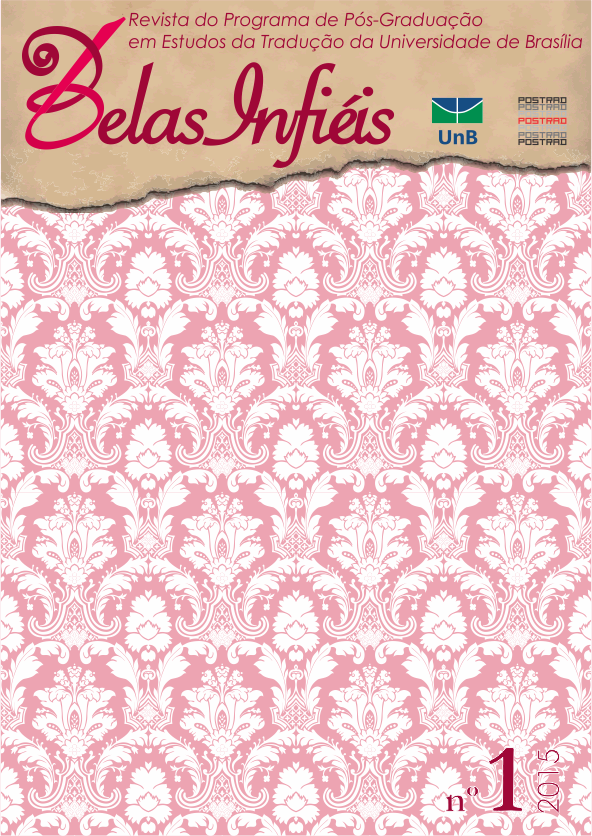TO EAT OR NOT TO EAT...IN VIGO:
THE TRANSLATOR SOLVES THE DILEMMA
DOI :
https://doi.org/10.26512/belasinfieis.v4.n1.2015.11313Mots-clés :
Translation, Food, Culture, TourismRésumé
What happens when a cruise tourist arrives in Vigo (Galicia-Spain) and feels culture-hungry enough to explore the local cuisine? There are two possible ways to go about it: walking around the port area and trying some of the exquisite dishes which are kindly offered by the surrounding caterers, or with modern day technology surfing the city’s websites, for example, http://www.turismodevigo.org. Precisely here, some of the information offered deals with typical food any visitor can taste and includes recipes and information about food festivals. “[A]s all our behaviour is culture-specific” (Vermeer, 1994, p. 10), this paper aims to discuss how the translation of food on this mainstream website translated from either Spanish or Galician (or both) into English and Portuguese, yet not into French or Italian, can encourage or discourage visitors from savouring some of the most typical Galician dishes. One of the challenges of Translation Studies is dealing with cross-cultural references, which always increase the difficulty of transferring content from one language to another. The specific cultural barriers related to food might lead the translator to modify, adapt or even omit some of the content in order to make the translation (and explicitly the food) more delectable.
Téléchargements
Références
ANTONINI, Rachele; CHIARO, Delia. The Quality of Dubbed Television Programmes in Italy: the experimental design of an empirical study. In: ALBERTAZZI, Silvia; BONDI, Marina; BUONANNO, Giovanna; Nick MAXWELL, Claudia PELLICONI, Marc. SILVER (Eds.), Cross-cultural Encounters: New Languages, New Sciences, New Literatures. Roma: Officina, 2005.
DURÁN, Isabel. Analysing common mistakes in translation of tourist texts (Spanish, English and German).Onomázein, Chile, vol. 2, n. 26, p. 335-349. 2012.
KATAN, David. Il doppiaggio del cartone animato tra impossibilità e successo. In: DE ROSA, Gian Luigi (Eds.), Dubbing Cartoonia. Mediazione interculturale e funzione didattica nel processo di traduzione dei cartoni animati. Casoria: Loffredo Editore, 2010.
LARSON, Mildred. Meaning-Based Translation: A Guide to Cross-Language Equivalence. Lanham and New York: University Press of America, 1984.
NEWMARK, Peter. A textbook of translation. New York: Prentice Hall, 1988.
NORD, Christiane. Translation as a purposeful activity. Manchester: St Jerome, 1997.
SOTO, Jorge. La traducción de términos culturales en el contexto turístico español-inglés: recepción real en usuarios anglófonos. Quaderns, Revista de traducció, Barcelona, n. 20, p. 235-250. 2013.
VERMEER, Hans. Translation Today: Old and New Problems. In: SNELL-HORNBY, Mary et alii., Translation Studies ”“ An Interdiscipline. Vienna: John Benjamins, p. 3-16. 1994.
VLAKHOV, Sergei; FLORIN, Sider. Neperevodimoe v perevode. Realii. Masterstvo perevoda. Moskva: Sovetskij pisatel, n. 6, 1969, p. 432-456. 1970.
Téléchargements
Publié-e
Comment citer
Numéro
Rubrique
Licence
Copyright Statement
Given the public access to this journal, the texts are free to use but requires the recognition of the original authorship and initial publication in this journal to be properly stated.
The journal allows the use of works published for non-commercial purposes, including the right to submit the work to publicly accessible databases. Published contributions are the sole and exclusive responsibility of the author(s).
- When submitting papers to be evaluated by the Belas Infiéis journal, the author(s):
- Declare that the contents of the contributions are original and of their original creation, being entirely responsible for their content if there is an objection by third parties.
- Claim to be aware that they should not commit academic plagiarism.
- Declare that the manuscript has not been published, completely or partially, in Portuguese or another language. If it is a translation it should be submitted to the Translated Articles section.
- Declare that the manuscript is not being evaluated by other journals.
- Declare that the manuscript was not submitted to another journal simultaneously.
- Commit(s) to inform the journal of any kind of error or inaccuracy in their contribution (published, in evaluation or in editing) and to collaborate with the editors to make due corrections of the article (when in evaluation or editing) or erratum/retraction (after publication).
- Declare that there is no conflict of interest regarding the published work.
- Authorize its release if it is accepted for publication without any kind of monetary compensation.
- Agree to assign non-exclusive rights to publication to the magazine, remaining free to make their contribution available in other media as long as the publication of the first version in Belas Infiéis magazine is mentioned. They also authorize Belas Infiéis to assign their texts for reproduction in content indexers, virtual libraries and similar platforms.
- Maintain copyright and grant the journal the right of first publication, the work being licensed under theCreative Commons Attribution License.
- Is/Are allowed and encouraged to publish and distribute their work online after the editorial process, which may increase the impact and citation of the published work.
- Authorize the editorial team to make textual adjustments and to adapt the article to the publication rules, when necessary.



















